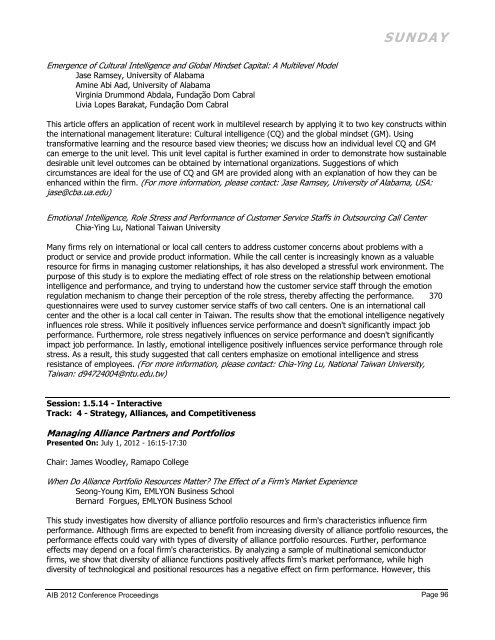AIB 2012 Conference Proceedings - Academy of International ...
AIB 2012 Conference Proceedings - Academy of International ...
AIB 2012 Conference Proceedings - Academy of International ...
Create successful ePaper yourself
Turn your PDF publications into a flip-book with our unique Google optimized e-Paper software.
SUNDAY<br />
Emergence <strong>of</strong> Cultural Intelligence and Global Mindset Capital: A Multilevel Model<br />
Jase Ramsey, University <strong>of</strong> Alabama<br />
Amine Abi Aad, University <strong>of</strong> Alabama<br />
Virginia Drummond Abdala, Fundação Dom Cabral<br />
Livia Lopes Barakat, Fundação Dom Cabral<br />
This article <strong>of</strong>fers an application <strong>of</strong> recent work in multilevel research by applying it to two key constructs within<br />
the international management literature: Cultural intelligence (CQ) and the global mindset (GM). Using<br />
transformative learning and the resource based view theories; we discuss how an individual level CQ and GM<br />
can emerge to the unit level. This unit level capital is further examined in order to demonstrate how sustainable<br />
desirable unit level outcomes can be obtained by international organizations. Suggestions <strong>of</strong> which<br />
circumstances are ideal for the use <strong>of</strong> CQ and GM are provided along with an explanation <strong>of</strong> how they can be<br />
enhanced within the firm. (For more information, please contact: Jase Ramsey, University <strong>of</strong> Alabama, USA:<br />
jase@cba.ua.edu)<br />
Emotional Intelligence, Role Stress and Performance <strong>of</strong> Customer Service Staffs in Outsourcing Call Center<br />
Chia-Ying Lu, National Taiwan University<br />
Many firms rely on international or local call centers to address customer concerns about problems with a<br />
product or service and provide product information. While the call center is increasingly known as a valuable<br />
resource for firms in managing customer relationships, it has also developed a stressful work environment. The<br />
purpose <strong>of</strong> this study is to explore the mediating effect <strong>of</strong> role stress on the relationship between emotional<br />
intelligence and performance, and trying to understand how the customer service staff through the emotion<br />
regulation mechanism to change their perception <strong>of</strong> the role stress, thereby affecting the performance. 370<br />
questionnaires were used to survey customer service staffs <strong>of</strong> two call centers. One is an international call<br />
center and the other is a local call center in Taiwan. The results show that the emotional intelligence negatively<br />
influences role stress. While it positively influences service performance and doesn't significantly impact job<br />
performance. Furthermore, role stress negatively influences on service performance and doesn't significantly<br />
impact job performance. In lastly, emotional intelligence positively influences service performance through role<br />
stress. As a result, this study suggested that call centers emphasize on emotional intelligence and stress<br />
resistance <strong>of</strong> employees. (For more information, please contact: Chia-Ying Lu, National Taiwan University,<br />
Taiwan: d94724004@ntu.edu.tw)<br />
Session: 1.5.14 - Interactive<br />
Track: 4 - Strategy, Alliances, and Competitiveness<br />
Managing Alliance Partners and Portfolios<br />
Presented On: July 1, <strong>2012</strong> - 16:15-17:30<br />
Chair: James Woodley, Ramapo College<br />
When Do Alliance Portfolio Resources Matter The Effect <strong>of</strong> a Firm's Market Experience<br />
Seong-Young Kim, EMLYON Business School<br />
Bernard Forgues, EMLYON Business School<br />
This study investigates how diversity <strong>of</strong> alliance portfolio resources and firm's characteristics influence firm<br />
performance. Although firms are expected to benefit from increasing diversity <strong>of</strong> alliance portfolio resources, the<br />
performance effects could vary with types <strong>of</strong> diversity <strong>of</strong> alliance portfolio resources. Further, performance<br />
effects may depend on a focal firm's characteristics. By analyzing a sample <strong>of</strong> multinational semiconductor<br />
firms, we show that diversity <strong>of</strong> alliance functions positively affects firm's market performance, while high<br />
diversity <strong>of</strong> technological and positional resources has a negative effect on firm performance. However, this<br />
<strong>AIB</strong> <strong>2012</strong> <strong>Conference</strong> <strong>Proceedings</strong><br />
Page 96

















